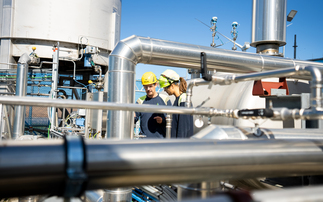From green energy to low-emission cars, ATI's Mike Appleby reveals the investment sectors tipped for growth in 2017
Looking ahead to 2017 - and putting political uncertainty aside - our investment team still believe that over the long term, investing in high quality business, with attractive valuations and strong business fundamentals, is still the best bet. Here we want to share with you some interesting investment opportunities for 2017.
The energy transition
We think energy sources that emit high amounts of carbon will continue to be replaced with lower carbon emitting alternatives such as wind and solar. This will disrupt the incumbent thermal power generators in particular, which look structurally challenged. As renewables become cheaper, fossil fuel power generation will come under further pressure as it loses its economic advantage. However, despite this disruption from increasingly cheaper renewables, we think renewable companies will continue to compete fiercely with one another and struggle to deliver profitable growth.
We continue to like exposure to energy efficiency as a cost-effective way to reduce wasted energy and save money. Companies specialising in building insulation, efficient lighting, fuel efficiency, upgrades to the grid and automation of energy management look the most compelling ways to invest in the profound changes we see happening in energy. Companies set to benefit from this investment theme include Kingspan, Prysmian, Schneider Electric, Gamesa, Philips and Acuity.
Enhancing digital security
From researching this theme we've seen that the increase in data volumes, driven by cloud and mobile computing, is changing the digital landscape and increasing the threat from cyber crime. It is estimated cyber crime costs the global economy US $400bn (£308bn) every year. We think this figure will continue to rise and significant investments will continue to be made in cyber security to decrease this threat. Governments are likely to be the biggest spenders; for example in the US the government cyber security budget is expected to rise 17 per cent to $19.1bn in 2017.
Security budgets have risen steadily in recent years and show no sign of slowing. A recent survey by Bernstein suggests that the majority (61 per cent) of companies will see IT security spending growing more in 2016 than it did in 2015. Interestingly, this is the case for both large and small companies.
Companies exposed to the security theme include IT service companies such as Accenture, Cap Gemini or Cognizant that have also developed significant IT security practices around the implementation and customisation of security software. Others include US network security firm Palo Alto, which develops firewalls and provides services in the cloud such as malware scanning and web filtering.
We think the cyber security industry is likely to see strong growth over the next decade as we generate and consume more data. This will present interesting investment opportunities for investors who are able to identify the winners early. Our process, which actively targets long term innovators, is well suited to this task and we expect this trend to be increasingly reflected in our portfolios.
Safer and less polluting cars
Car manufacturers continue to look challenged by increasingly strict global emissions and safety regulations. This means car builders will have to spend more money putting increasing amounts of technology in their cars to meet the rules. Specialist companies that provide the components for auto-safety, semi-conductors (increased content in cars from these trends), and fuel efficiency equipment are beneficiaries of this long-term trend, making them potentially interesting investments. We also believe electric vehicles will be very disruptive to this industry. In our view, expectations of how quickly electric vehicles will replace the internal combustion engine are underestimated by the market. This reinforces our view to avoid incumbent car manufacturers in favour of specialist equipment makers who are making components for the cars of the future. Companies which are set to benefit from this investment theme include Continental, Hella, BorgWarner and Infineon.
Enabling innovation within the healthcare system
We think innovative, cost effective healthcare provision that improves patient outcomes will be in demand. This includes advances in cancer treatment that use the immune system to fight cancer as well as provision of cheaper DNA sequencing.
We are currently seeing exciting innovation in cancer treatment, or oncology, where therapies are being developed that are revolutionising the way in which we think about and treat cancer. With a number of new treatments already approved, companies at the forefront of this new wave of medicine are set to benefit from what could be the most significant breakthrough in cancer treatment to date.
Immuno-oncology treatments work by essentially turning off the ‘brake' that the body's immune system has activated when you get cancer. There are five key firms globally currently producing and trialling these treatments; Bristol Myers Squibb, Roche, Merck, AstraZeneca and Pfizer. Each has a different approach to its trials and with this technology at such an early stage of adoption, the long-term winners are still not clear. However, there have been positive results so far with the drugs working to fight lung, skin and kidney cancer and we continue to see opportunities in this field.
Immuno-oncology remains a nascent and not yet fully proven cancer treatment with a number of questions as yet unanswered about its long term effectiveness. There are also questions over how we will pay for these treatments, which can cost between $150,000 and $220,000 per patient, per year. Nonetheless, we are arguably at the beginning of something that could revolutionise the way we treat cancer. Immuno-oncology has already shown that it can offer something that existing treatments can't, and with a market valuation of around $100bn over the next five to 10 years, there is a clear opportunity for early investors.
Delivering healthier foods
We anticipate continued demand from consumers for healthier food. We like companies in the food industry that differentiate themselves by their healthy foods or by providing services helping food companies make their food healthier. An example of this is changing food recipes (of the foods they sell) to reduce calories and salt content and still keeping the food tasty. Companies we like positively exposed to these areas are Kerry Group, DSM and Chr. Hansen.
Being positively associated with a theme is not, in itself, a guarantee of investment returns. For investments to succeed, we think they need three main characteristics. Namely:
- they are positively exposed to long-term trends happening in their industry;
- have robust business fundamentals (can generate profitable returns), in a well managed business;
- and trade on an undemanding valuation given their potential future profitable growth.
We have over twenty different investment themes which affect a broad range of industries. This means we can build diversified portfolios of investments in which we have conviction. Many of these themes are linked to sustainable development goals and are long-term in nature. We believe understanding industry trends is a good place to start before doing more stock specific fundamental analysis to ensure the business is of high quality and likely to generate excess returns.
Mike Appleby is an investment manager at Alliance Trust Investments
The value of investments and the income from them may go down as well as up and is not guaranteed. Investors may not get back the amount invested. Examples of stocks are provided for general information only to demonstrate our investment philosophy. It is not a recommendation to buy or sell and the view of the Investment Manager may have changed.








